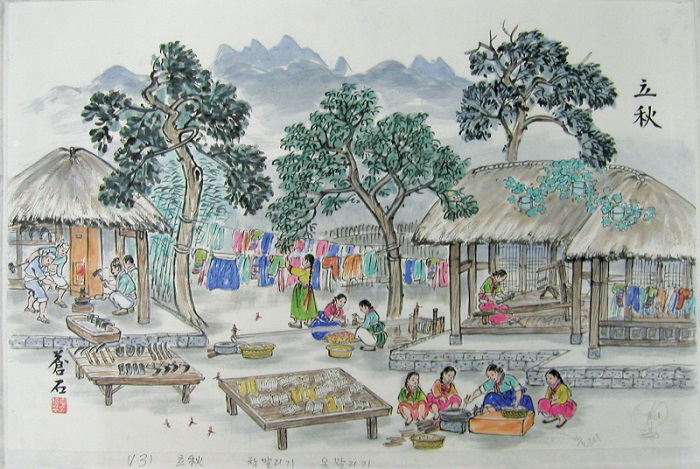This Sunday, Aug. 7, marks Ipchu (입추, 立秋), the 13th of 24 solar terms on the traditional farming calendar and the formal beginning of "autumn" for agricultural communities of the past. Ipchu also marks the half-way point through the farming year, as the traditional farming "spring" and "summer" have finished and we have begun the traditional farming "autumn".
For the rest of us, autumn actually begins on the autumn equinox, which is Thursday, Sept. 22, this year, when the number of daylight hours and nighttime hours will be roughly equal. For traditional East Asian farming communities, however, the autumn begins with Ipchu.
Technically speaking, Ipchu begins when the Sun is at a celestial longitude of 135 degrees and ends when the sun's at a celestial longitude of 150 degrees. More often, however, Ipchu just refers to the first day, when the Sun it at 135 degrees, which is this Sunday.

Ipchu (입추, 立秋) marks the traditional beginning of autumn for farming communities of old. The evenings begin to cool down, and cabbages and radishes are planted for next year's winter kimchi.
Ipchu normally falls in the seventh lunar month, which began on Tuesday, Aug. 2, this year. It falls between the solar terms of Daeseo (대서, 大暑), or the Day of Big Heat, which fell on July 22 this year, and Cheoseo (처서, 處暑), or the Day of the End of the Heat, which will fall on Aug. 23.
For traditional agricultural communities, Ipchu was regarded as the end of the summer and the beginning of the fall, which lasts until Ipdong (입동, 立冬), the beginning of the farmer's winter that is on Nov. 7 this year.
The continuous fine weather around Ipchu is an important condition for the maturation of rice and other crops. During Joseon times (1392-1910), if it rained for over five days in this season, the royal household organized sacrificial rites in the capital and in the area affected by the rain, with the goal of asking the rain gods to stop the rain. Farmers used to predict their harvest based on the weather on Ipchu. If it was clear, they believed that the harvest would be abundant. If the forecast called for heavy rain, it was seen as a sign of impending crop failure. Thunder on this day indicated a poor harvest of rice, while an earthquake meant that cows and goats would be killed the following spring.
Around Ipchu, the evenings become cooler and a bit windy, and farmers start to prepare for the upcoming harvest season and for winter itself. One of the most important tasks for farming households is to plant cabbage and Asian radish that will be used to make kimchi for the winter months.
Though we live in cities nowadays, spare a moment for our ancestors of the past, who lived close to the earth and close to the seasons, and spare a moment to think about Ipchu, the beginning of fall and the turning of the seasons, this Sunday, Aug. 7.
This article was made possible through cooperation with the National Folk Museum of Korea and its Encyclopedia of Korean Folk Culture.
By Gregory C. Eaves
Korea.net Staff Writer
Photos: Encyclopedia of Korean Seasonal Customs
gceaves@korea.kr